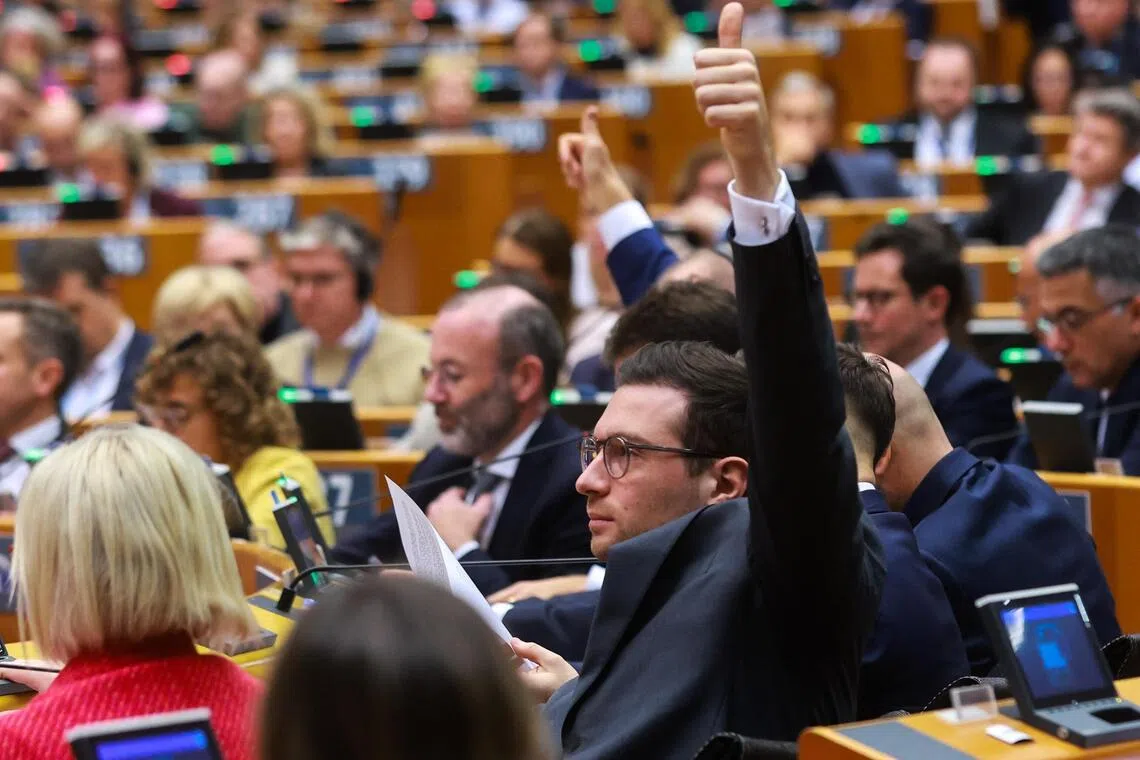Far-right puts its stamp on European Parliament
Sign up now: Get ST's newsletters delivered to your inbox

French Member of the European Parliament and chairman of the Patriots for Europe group Jordan Bardella voting at the European Parliament on Nov 13.
PHOTO: EPA
- The EPP and far-right parties are increasingly collaborating, as seen in recent votes on environmental legislation, indicating a potential shift in the European Parliament.
- Far-right lawmakers express optimism, viewing these collaborations as a breakthrough. Centrists and socialists warn of the dangers of normalising cooperation with the far-right.
- While not a formal alliance, this rightward tilt, also seen in member states, could impact key policies like migration and the 2035 combustion-engine car ban.
AI generated
STRASBOURG, France - Far-right parties are riding high in the European Parliament after teaming up with the mainstream right to get key texts past the finish line – fuelling ambitions to tilt the assembly their way.
Twice in as many weeks, the conservative EPP party of EU chief Ursula von der Leyen has joined with the far-right bloc to unravel flagship environmental legislation, to the dismay of the left.
Earlier this month, the camps teamed up to gut a Bill imposing social and environmental due diligence on big companies – in the name of cutting back red tape.
On Nov 26, they did it again by backing a one-year delay to a landmark law aimed at curbing deforestation – a move also supported by part of the centrist group, Renew.
Less than 18 months after making big gains in EU elections, the far right is delighted at the turn of events.
“We’re at a tipping point,” said a lawmaker from the Patriots group, which is headed by France’s National Rally, speaking anonymously.
“The firewall against the far right no longer exists. On the right, they see we’re getting work done, and they believe we can find common ground.”
Green lawmaker David Cormand – whose party is one of the EPP’s traditional allies along with the centrists and socialists – urged the conservatives to come clean on whether they plan to switch coalition strategy.
“Things are sliding, shifting – I’d rather it be acknowledged and out in the open,” he said.

European Commission president Ursula von der Leyen delivering a speech at the European Parliament in Strasbourg, eastern France, on Nov 26.
PHOTO: AFP
‘The floodgates have opened’
On most of the texts brought before Parliament since the June 2024 election, the mainstream centrist alliance has prevailed – but it is a fragile equilibrium, and tensions are running high.
Social Democrat leader Iratxe Garcia Perez and EPP chief Manfred Weber regularly trade barbs, with the conservatives accused by their pro-European partners of flirting with the far right.
“The floodgates have opened,” said the centrist lawmaker Laurence Farreng, urging the political mainstream to “wake up” to the risks of working with forces traditionally hostile to the European project.
By contrast, French lawmaker Celine Imart – who belongs to the right wing of the EPP – said she welcomed the chance to work with different partners if it helps “unravel all the Green Deal texts” from the previous legislature.
“This isn’t about a grand design or formal alliances,” she told AFP. “It happens on certain texts. The only thing that matters is the content.”
Meloni’s growing sway
The Parliament’s rightward tilt mirrors similar shifts taking place among the bloc’s EU member states.
It was European leaders – including France’s Mr Emmanuel Macron and Germany’s Mr Friedrich Merz – who first called for scrapping the corporate due diligence law, for instance.
And before Parliament’s vote on Nov 26, EU countries had already backed delaying the anti-deforestation law until late 2026.
Among the bloc’s 27 leaders, Italian Prime Minister Giorgia Meloni appears increasingly influential – benefitting from something of a leadership vacuum, with Mr Macron weakened at home, and Mr Merz bogged down by coalition infighting.

Italian Prime Minister Giorgia Meloni appears increasingly influential among the European Parliament’s 27 leaders.
PHOTO: AFP
In Strasbourg, the ECR group – which is home to Ms Meloni’s far-right Brothers of Italy – often acts as a bridge between conservatives and the far right.
Seen as less strident than the other two hard-right groups – the Patriots and the smaller Sovereignists – ECR lawmakers have secured key posts, including as budget and agriculture committee chairs.
Does the budding alliance of right and far-right point to a more lasting shift?
Not necessarily, says one Parliament insider.
“You can’t say... the pro-European majority is dead – that’s not true,” said the official, who predicted conservatives’ first choice for passing laws “will still be the centre”.
“If that’s too hard, then the EPP may turn to the far right.”
That said, he predicted the new alliance on the right could tip the balance on several sensitive issues in coming months – from ramping up pressure against a 2035 ban on new combustion-engine cars, or pushing for tougher migration policies. AFP


